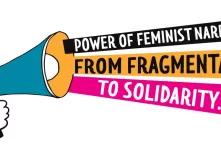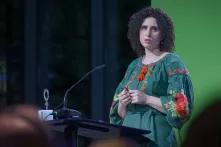Within feminist thought, fragmentations are born out of the variance of lived experiences of individuals and the webinar series- ‘Power of Feminist Narratives: from Fragmentation to Solidarity’, organised by the Heinrich Boll Stiftung Foundation in collaboration with One Future Collective, aimed at strengthening existing solidarities and creating new approaches for solidarity between feminists globally. This emerged in the context of populist anti-feminist narratives that sought to dilute feminist efforts.
The fifth online seminar in this series explored the role of language in the feminist movement. Language, which often has oppressive roots, also ends up reproducing oppression. As one of the primary tools for narrative shaping, the panel explored how reclaiming language can prove empowering for the feminist movement. The online semianr also invited participation from the audience by conducting short Zoom polls and hosting a Padlet for the audience to post their thoughts and reflections.

Language is a tool of the privileged and by the privileged.
That language is a reality-shaping tool and has been acknowledged by activists and philosophers alike. Language is rightfully considered synonymous with power since it quite literally shapes and is shaped by dominant narratives. Often due to the very semantics, language ends up ‘othering’ people. It thereby becomes an instrument that gives life to the domination-liberation continuum. Since language is so ubiquitous, it becomes easy to neglect how it replicates power and privilege, although it also has the ability to foster relationships. Social justice activists were quick to realise this and use the transformative power of language to serve the change they sought. Feminists across the world have also reclaimed and even repurposed language to serve them.
The fifth webinar held on 7th March focused on how language could be recast into a feminist mold and used as a power-offering tool. The discussion featured Minna Salami, a feminist author and social critic at the New Institute, and Urvashi Butalia, author and the Founder of Zubaan Publishing in India. The discussion was moderated by Vandita Morarka, the Founder and CEO of One Future Collective, a feminist social purpose organisation based in India.
Creating empowering narratives
The term “empowerment” was originally coined by feminists from the Global South. It is a term that has come to be closely associated with feminist discourse. It is also considered to subsume concepts such as self-determination, agency, and autonomy within it. The term empowerment is used in the context of shifting or altering something for the oppressed people. However, it is equally a paradox since it gives the agency for this shift to people other than those whom it affects. Both panellists also shared that the term ‘empowerment’ was co-opted by their respective States. Empowerment though, was used with caution by the panellists, since they highlighted that the implicit connotation of ‘giving power’ undermines the strength of collective mobilisation. This is not to dismiss the individual and collective experiences of empowerment, but instead situate them in a specific context. Hence, it has a three-fold connotation: as a politicised term, as a term that creates a sense of subjecthood, and as a term for self-declaration.
Empowerment and oppression, in fact, are not contradictory terms but can exist simultaneously. For empowerment, it is imperative to create narratives that are affective and impact us psychologically, socially, and spiritually. This echoes the sentiments of panellists Julia and Li from the first online seminar who mentioned that narratives must ‘affect the hearts and minds of people’. It is in fact, the act of foregrounding and visibilising voices on the periphery, that becomes empowering and subversive. The notion that better and fuller lives are possible transgresses barriers. To quote Urvashi,
Any narrative by virtue of being feminist is empowering.
Feminist writing in a fragmented world
The feminist movement is accused of being notoriously fragmented. The connotation here is that fragmentation is undesirable and that all feminisms must be brought together. Reiterating the reflections from the fourth online seminar, the plurality of feminisms is inevitable due to the various contexts. Thus, it is important for us to distinguish between a world that is ‘fragmented’ and one, which is ‘different’. Feminism resists domination, and by extension resists fragmentation. Intersectionality, which is a guiding principle for the feminist movement, is also a defragmenting ideology by virtue of foregrounding the lived realities of people grappling with intersecting systems of oppression. By virtue of this, Minna highlighted that,
Feminism is an ideological and political movement that brings hope to a fragmented world.
In this instance, feminist writing becomes an adhesive that connects different strains of feminist thought. It also kindles a feminist becoming.
The limits of language for a feminist movement
In a fragmented movement, language presents both a challenge and an opportunity since writing has the power to travel through various mediums. As highlighted in the earlier discussions, it can travel through songs, social media, art, and various other oral forms. Translation, for instance, facilitates this opportunity and helps mitigate the burden (to some extent) of writing in languages with colonial roots. Here too, the truth of the author must be foregrounded and the translator’s social position must interfere as little as possible. The control and power of language must be wrested and safeguarded to ensure that it is not corrupted by populism. We must thus demand from our language that it incorporates spectrums of identities and experiences to reclaim it. Minna mentioned that,
Living a feminist life is more important than speaking about it.
Having said this, it is also imperative for us to be cognisant of documenting and “narrativizing” feminist lived realities so that they are not erased or invisibilized by dominant overbearing narratives. You can read up on storytelling as a form of “narrativization” in our blog summarizing the first online seminar.
When words and languages that are not one’s own are imposed, it leaves a gaping, palpable silence. Silence represents the gap in vocabulary and can hold significant truths. Due to the normalisation of violation and violence, there is often no vocabulary to call them out as such. To become better feminist writers, Urvashi suggested that,
Learn to listen so silence for it reveals what is hidden and why it is hidden.
This paves the way for feminist ingenuity by creating new words and languages.
Feminist language in practice
Language reformation needs us to band together because an individual cannot unravel the hurt, hierarchy and insult that is entrenched in language all alone. Moreover, such a long-standing and sticky institution cannot be shaken by an individual. It can be made possible only by a massive shift in the collective conscience. This shift is gradual and in the meantime, we can perhaps use and develop strategies to deploy more feminist language. As feminist activists, it is crucial for us to be aware of the language we are using, its purpose and how it is positioned in addressing the plurality of feminism.
Language and access are interrelated and so, language that is only understood by a select few people can translate into alienation. For instance, an academic understanding of a feminist concept might not be understandable or affective while campaigning. Collaborating with other feminist groups who have experience in narrative building could also offer incredible insights in shaping feminist language.
However, while undertaking feminist action, it is also important for us to keep ourselves safe and ensure our own well-being. Feminists are often accused of pontificating from the comfort of their homes. As Vandita highlighted,
There is a comfort with more theoretical things since it allows for overlooking feminism’s rootedness in politics.
A delicate balance between theory and activism is necessary as one nourishes and informs the other.
Language is an everyday battle and feminists have been locking horns with it in their own ways. They have reconstructed language to overcome the inherent patriarchy entrenched in it. Some have begun social media pages for building communities to break the gendering in language. Language is an interesting juncture to work at for it is at the intersection of both theory and practice and affects them simultaneously. Perhaps it is time to disrupt language the feminist way!
The discussion was held primarily in English with the facility of interpretation in Spanish since the panellists and participants participated in the discussion from across the globe. This was also in full cognisance of the fact that interpretation might prove inadequate in translating experiences and/or context-specific realities accurately.
Resources shared during the discussion
- The Story of a Poem by Chandrika Balan


